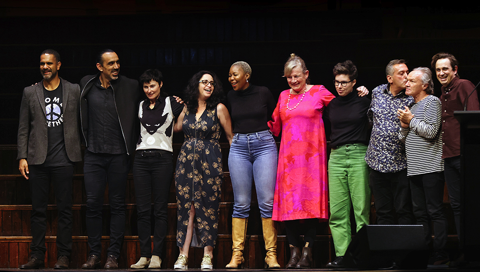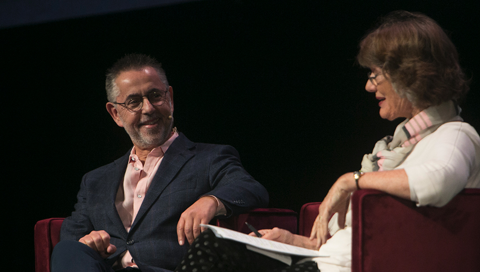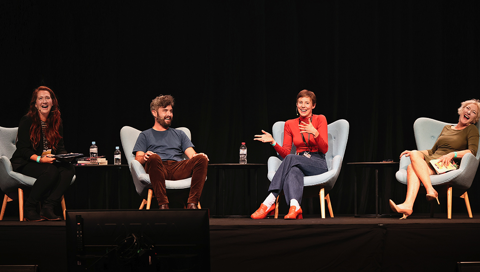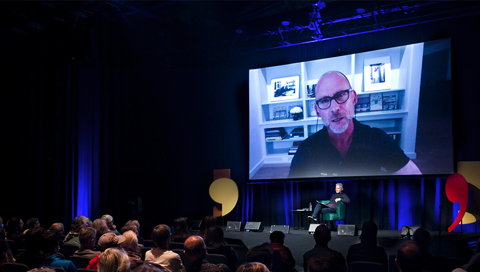“We invite you to walk with us... It’s 2021, Australia we’re still waiting.”
Explore upcoming events
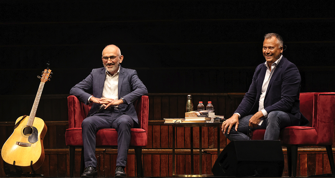
Attending the Sydney Writers’ Festival can be a giddy and gleeful experience – especially when hopping from Bays to Tracks venues and back again, oscillating between your favourite authors on stage, world-expanding conversations, powerful stories that unravel the boundaries of imagination and intellectually punctilious discussions that pinpoint our greatest problems. Ideas, stories, memoir and poetry abound.
Here are just some of the special moments – and words – we captured on Friday.
Stan Grant and Paul Kelly
At Sydney Town Hall last night, Paul Kelly and Stan Grant came together for a memorable and significant conversation on the pain and joy of poetry. In a deeply touching moment that made real that exact wondrous power, Stan Grant responded to Paul Kelly's performance of a beautiful song about magpies with a revelation of a dream his father had shared with him about magpies recently that went hand in hand with Stan's love and concern for his family.
Within Reach Gala
One of the most extraordinary events in the Festival's history, the Within Reach Gala was an astounding procession of Australian literary talent. We were challenged, transfixed and changed by the powerful stories shared by Tony Birch, Geraldine Brooks, Trent Dalton, Ceridwen Dovey, Adam Goodes, Alison Lester, Fiona McGregor, Sisonke Msimang, Michael O’Loughlin, Christos Tsiolkas, Maria Tumarkin and Ellen van Neerven.
Trent Dalton
The many fans of Trent Dalton descended on Chatswood to hear the bestselling author speak with Stephen Romei. After an unforgettable conversation about his larger-than-life characters and hauntingly beautiful stories, Trent received a standing ovation.
“That pandemic took our embraces but we warmed ourselves with words.”
Norman Swan and Jonathan Swan
Father and son, Norman and Jonathan Swan, teamed up on stage for an erudite, heartfelt and hilarious conversation – not without some barbs and banter. Norman revealed he still helps Jonathan with his school projects – the project being his now-famous Trump interview. But Jonathan got his own back, rambunctiously announcing that all of the many thoughtful questions from the audience were from him – not dad.
“This collective fury is so bright, so full of possibility, it feels as though freedom is in reach.”
Rebecca Giggs and Nam Le
Upon taking up Nam Le’s copy of her powerful, surprising and compelling non-fiction debut, Fathoms, to read to the audience from, Rebecca Giggs looked down and saw all Nam's careful annotations scribbled inside this book he loved so much.
Nam revealed he’d been waiting in great anticipation for Giggs’ book ever since he first read her piece 'Whale Fall' in Granta in 2015, and cemented himself as a true fan.
“The book is more a place to consolidate your nerve, to sit with difficult ideas, to move yourself from inaction and a feeling of hopelessness to usefulness and then after that, hope.”
Ashe Davenport
In Writing the Unspeakable, three remarkable memoirists – Ashe Davenport, Fiona O’Loughlin and Lech Blaine – shared how they tackled difficult and taboo topics. In one of the most powerful moments of the Festival, Ashe revealed the moment she spoke aloud her fears, shames and despair out loud and began to heal, "I quickly said it to my partner and there was a crack. It's writing the unspeakable, you start to heal...".
Nayuka Gorrie
When Nayuka Gorrie was first asked to guest curate this year’s Festival, they thought to themselves, “Who do I want to sit around and have a yarn with?” That initial thought resulted in a panel of powerful Black women writing from the frontlines.
As Gorrie opened the session, they did something not often seen on a Festival stage, they took the time to ask each panelist, one by one, how they were. When Nayuka’s mum, Veronica Heritage-Gorrie (author of Black and Blue) responded that she was “doing fine,” Gorrie circled back to make certain that was actually the case.
Later Gorrie referred to the work of writers like Melissa Lucashenko and Evelyn Araluen, who were also in attendance: “When I read Black women, I feel like I’m reading the truth. I’m reading the truth of this place.”
“They don't like it when we speak back to the archive.”
Next Chapter
As the three recipients of The Next Chapter writers’ scheme joined their mentors on stage – Dan Hogan and Rebecca Giggs; Oliver Reeson and Maria Tumarkin; and Jonathon Slottje and Bruce Pascoe – they each took the time to share what they appreciated most within each other’s work. After discussing the undervaluing of editors in this country, the level of risk-taking in the publishing sector at present, and how to avoid second-guessing what sort of tangible product the world wants from you as a writer, Tumarkin went on to sum up the notion of mentoring in a (no surprises here) poetic fashion...
“It’s the knitting of souls. The knitting of two people trying to work out why they write.” Maria Tumarkin on mentoring Oliver Reeson in the Next Chapter Writer’s scheme.”
Judy Blume
At Judy Blume's talk, you could hear a pin drop as more than one set of misty eyes heard the words of this iconic writer that had accompanied them through adolescence. "It was like being in a warm hug," said one audience member.
“I lived inside those books and characters. It changed my life and maybe saved my life.”
Kerry O’Brien
Kerry O’Brien performed a heartrending eulogy of legendary political reporter Mungo MacCallum to an audience that included Mungo's wife, Jenny Garrett. At times funny, other times deeply touching, it was a worthy honour for one of Australia's greatest journalists.
Bill Hayes
When Bill Hayes last joined Sydney Writers’ Festival in 2017 to speak about his memoir, Insomniac City, the world looked very different. This time, he joined Anton Enus via live video from the heart of New York City to speak about his new book, How We Live Now.
"My god, things were so different one year ago," Bill said. "New York is really swinging back to life. Everyone is talking about how this summer almost feels like the roaring 20’s.”
Laurie Penny, Virginia Trioli and Sisonke Msimang
We said the feminists were coming to the Festival – and they certainly brought with them hard truths, powerful insights and stirring ideas. In an intellectually rigorous and passionate discussion, Laurie Penny, Virginia Trioli and Sisonke Msimang tackled it all, from differing perspectives between different generations of feminists, to the problem of 'additive feminism' that takes as its premise that real feminism is white women's feminism, to privilege, politics and accountability. But it all came back to hopeful strategy. “I do have this defeating feeling right now that it’s the same problems all over again," said Virginia Trioli. "But what you have to do is figure out the feminism that works best for you and apply it in your life.”
“The point of having conversations like these is to counter the unbelievable gaslighting in the world.”
Kate Holden and Caro Meldrum-Hanna
As Kate Holden and Caro Meldrum-Hanna spoke about what makes a tragedy worth reporting on or writing about, with Ange Lavoipierre, they stressed the importance of initially asking yourself a number of questions. Is it unresolved? Are there voices that haven’t been heard? Are their conflicting accounts? And is it in the public interest?
The panel went on to speak about the responsibility to delve into tragedy with sensitivity and compassion, and ultimately, the tasks of seeking to understand and empower your subjects. Meldrum-Hanna remarked that, “If you don’t seek to understand a person, you’re never going to be able to ask the right questions, you’ll misfire.”
“Empowered people make powerful and empowering stories.”
